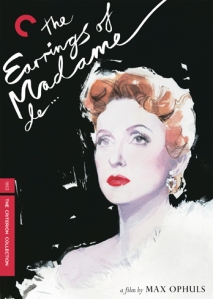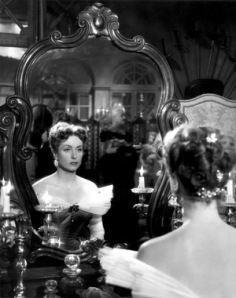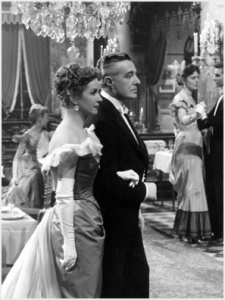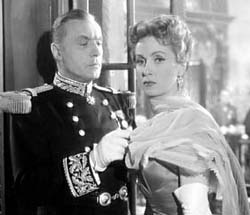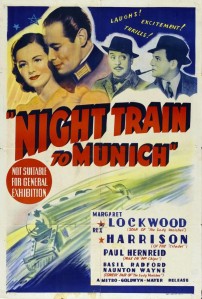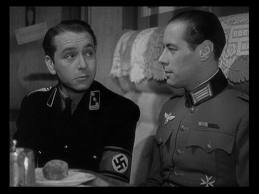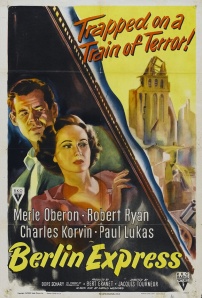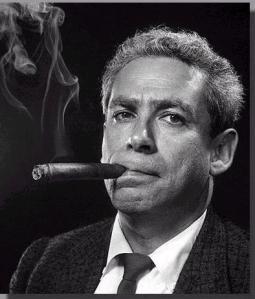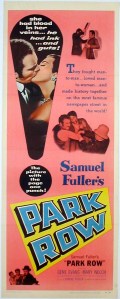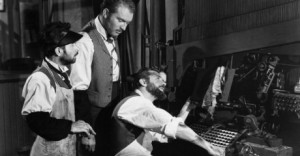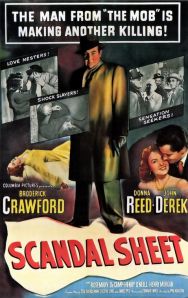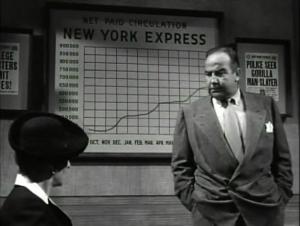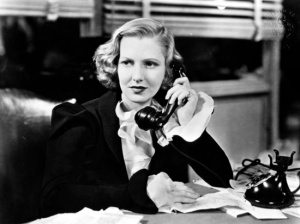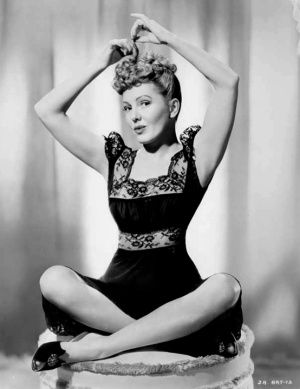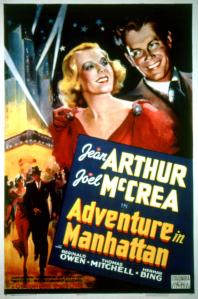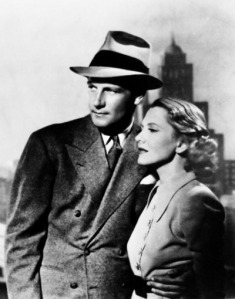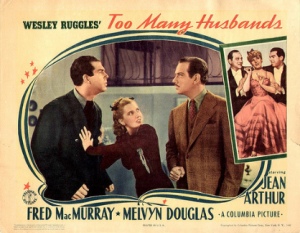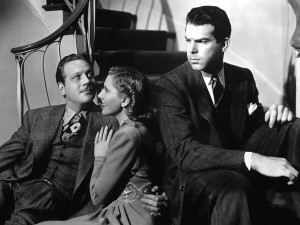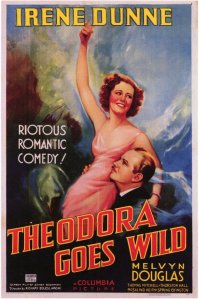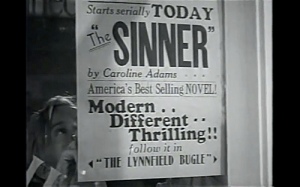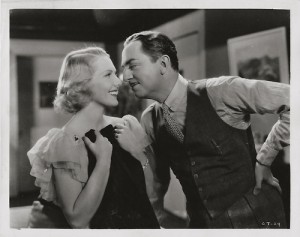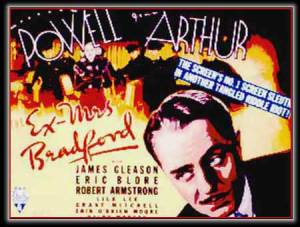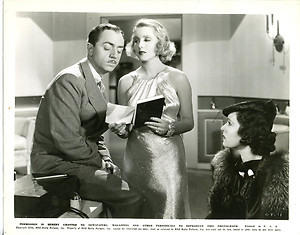Despite having this on DVD it has sat unwatched for a while. I’m not a huge fan of costume drama or melodrama, have only recently started to explore Charles Boyer’s American work, and unfortunately not seen anything else by Ophuls or Italian neo-realist director De Sica who here plays the second male lead. Thankfully it was then shown at Chapter Arts in Cardiff and, having a few ideas of the strengths of Ophul’s work I felt it would be better to experience it on the big screen.
This was evidently the right choice from the very first scene. A wonderful swooping tracking shot that follows Danielle Darrieux’s eye from jewellery drawer to fur cupboard and then follows her, seemingly in the same take, around her mansion, down flights of stairs, into rooms, back again, through windows and doors. Never losing her from the centre of the screen, connecting you to her but making you admire the shot at the same time. The movie does this again and again, what must have been painfully constructed takes that have the camera floating around corners and looking down stairwells, somehow making you notice the take but also grounding you in the architecture, putting you in those buildings and making them seem lived in and more than sets. Taking you out of and into the movie at the same time.
The most heralded scenes are probably the dancing ones where the camera moves incredibly gracefully but very forcefully through the dance floor, after most of these movements the film has a character, boyer or an extra, try to make their own way back through the crowd, having to pause and apologise and bump into the dancers that the camera had weaved through so effortlessly. Again Ophuls isn’t content with just to provide beauty onscreen but wants you to acknowledge how hard it was to achieve.
I can’t imagine that would have worked for me on DVD in my living room. I also can’t imagine it would have quite got across the use of candle light. Of candle light reflected on diamonds. Ophuls apparently wanted to shoot the movie entirely via what was seen in mirrors and while the idea did not come to fruition reflection still plays a massive part in many of the shots. Critics often talk about the beauty of black and white cinematography but this really is a film that delivers it. In colour it really would have seemed like just a costume drama to me. Here the blacks and whites but more importantly the strangely pastel greys have an odd warmth, everything feels smudged and shot through lace.
The movie follows a pair of earrings, an unwanted wedding gift of a loveless (at least on one side) marriage, sold by Louise the general’s wife to clear debts and then claimed to have been stolen. The jeweller secretly sells them back to the General, who passes them on a disposed of mistress, who, heartbroken, wilfully loses them at roulette in a Turkish casino. They are bought by an Italian diplomat, De Sica, who brings them back to Paris and eventually presents them to his new lover, Louise. Who, desperate to wear them for her lover, claims to have found them in a drawer not knowing her husband was well aware of her selling them. The General, Charles Boyer’s relationship with the earrings and particularly the Jeweller provides a lot of comedy in between Louise’s ever shifting relationships with the two men.
Ophuls’ somehow makes you feel for all three parts of the triangle, it at times reminded me of Jules Et Jim in the way the two men were swept up and doomed by the passions of the female lead. Both men start with an air of sophistication. Boyer has his own lovers and is happy to pay for his wife’s indiscretions as long as they remain hidden. De Sica sees Louise’s broken suitors and promises her he will not make their mistake of hoping to actually possess her. Boyer’s General, like seemingly everyone else in Paris, sees De Sica as good company for his wife while he is away and, almost, to the end there is a civility between the two men. Louise’s declarations to De Sica are always that she does NOT love him. It feels like three people who are doing fine until real passion intrudes and then things take on a fatalistic air that is reflected in the constant attempts at fortune telling. Boyer’s annoyance that the others haven’t played by the rules is possibly the only thing that makes his challenging De sica to a duel fit. He could handle his wife having suitors when she was motivated purely by narcissism but not her actually in love. Or maybe he really was more insulted by De Sica’s comments about the French army than about any matters of love.
Having known Boyer in English language comedies it was very interesting to see him in his native French, he is still funny, there are moments of incredible lightness alongside the tragedy and he is stiff,, pompous and proud but capable of kindness, although the kindness and gentleness seem to float around in amongst the more serious matters of his army career and position. He stops for a second to wonder what happened to his exiled lover and to express sorrow that she hasn’t done well in Turkey but then flicks back to the matters at hand.
He is no caricature and neither is De Sica’s Italian lover, he is shown to be an experienced seducer, someone who drifts through Europe playing games and moving on, quoting his diplomatic immunity to remove him from local trifles. He seems amused that he is genuinely caught in love and aware that it will doom him without it ever ruffling his knowing expression.
Danielle Darieux’s Louise is graceful, beautiful and trapped, like De Sica seemingly stunned by the realisation of love after all this time. She fights it, the scenes of her in Italy tearing up letters and raging at servants were great and ultimately she turns to God for help that doesn’t come. You end up feeling for all three of the leads.
An amazingly beautiful film that had me noticing all the details I often miss about the camera work and composition and design without ever breaking the hold of the story.
Two movies this week which are very different in tone but still have a lot in common. ‘Night Train to Munich’ and ‘Berlin Express’ are probably best described as being well thought of second tier movies by distinguished directors.
Sir Carol Reed is the man responsible for ‘Night Train to Munich’ and Jacques Tourneur for ‘Berlin Express. The better known ‘The Third Man’ and ‘Out of the Past’ are two of my favourite films. Of the two movies it is actually Tourneur’s ‘Berlin Express’ that has the most in common with Reed’s ‘The Third Man’.
As their titles suggest they also are both set in Germany and largely on trains. Both deal with plucky English speaking leads trying to protect elderly boffins from the Nazis. More interestingly they were both filmed very close to the Second World War and have a lot of interest to say about attitudes to Germany.
‘Night Train to Munich’ is a British movie from 1940 set during the period leading up to the declaration of war and the first few days of it. ‘Berlin Express’ is a 1948 American RKO feature from a French director that was filmed on location in Paris, Frankfurt and finally Berlin during the early years of the post war occupation. The film opens with a declaration that it was made with the help of the various occupying powers including the Soviets. It was notable as the first Hollywood production filmed in Germany after the war.
In ‘Night Train to Munich’ the Germans invade Czechoslovakia and imprison Margaret Lockwood, the daughter of a noted armour plating specialist, in a concentration camp. The British have flown her father to safety in London as the tanks rolled in. With the help of Paul Heinreid, a fellow prisoner she escapes and makes her way to London only for it to turn out that her fellow escapee is a German intelligence officer who kidnaps them both and brings them back to Germany.
With the countries on the brink of war British intelligence officer Rex Harrison, flies to Germany and passes himself off as a Wehrmacht Engineers officer with a history with both Lockwood and her father. He promises the Gestapo that given time alone with her on the train from Berlin to Munich he will win them both over to the Nazi cause. His cover is eventually blown but with the help of travelling cricket fans Charters and Caldicot he gets Lockwood and her father safe to Switzerland.
The presence of Lockwood and Charters and Caldicot as well as the Mittleuropean railway setting often gets this movie referred to as an unofficial sequel to Hitchcocks 1938 film ‘The Lady Vanishes’. Indeed Harrison’s character of an upper class irreverent hero with musical leanings is also very close to Michael Redgrave’s lead from the Hitchcock film. It also shared script writers Frank Launder and Sidney Gilliat. The male lead in this film was originally intended to go to Michael Redgrave and indeed there are internet references to Hitchcock being intended to direct, however he had left England for the safety of the United States by this point.
Despite the same script writers ‘Night Train to Munich’ suffers in comparison to the Lady Vanishes, Lockwood doesn’t have the same chemistry with the male lead and the impact of the war changes the tone considerably. Ironically in some ways the menace of the villains works far better in that film which really gives the impression of an unprepared childlike Britain still trying to play by a sense of honour the fast arming continent has left behind. Redgrave and Lockwood try to cling to rules that are clearly out of date and a genuine sense of menace is generated despite some fine witty dialogue. Amateur heroics and spying old ladies are up against automatic weapons and German efficiency.
Here with Britain at war with Germany we have British agents, no longer seemingly doddery old ladies like Miss Froy but charming, bilingual young men at home with a gun and clued in on the workings of the Nazi regime. The idea that Britain is ready and prepared to match German espionage and can get people in and out of Berlin under the noses of the highest levels of the German Military works as a propaganda idea during the Phoney war, as does the idea that the buffoonish Charters and Caldicot will snap to attention and play their part once war is declared. However it does remove the edge of the Hitchcock movie.
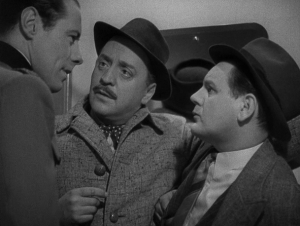
If I’m honest I’m not a fan of Rex Harrison and just wished I’d been able to see Redgrave in the part. Harrison spends a lot of time charming the Nazis with promises of being able to seduce Lockwood and this just accentuated the aspects of his persona I don’t like, as did his singing. Lockwood is beautiful here but not witty or exciting in the way she is in ‘Lady Vanishes’
Interestingly Harrison is matched every step of the way by Gestapo officer Heinreid (still billed as Paul Von Hernreid rather than the more wartime friendly alternative name of his Casablanca days). While Heinreid is not shown to be heroic he is dashing, ultra-competent and resourceful and very much the Teutonic mirror of Harrison’s lead. This kind of respectful portrayal of a German officer as a foe to be feared but not a monster would soon disappear from wartime movies and is one of the most memorable aspects of the movie. In fact he probably has more chemistry with Lockwood than Harrison does and at times you kind of resent him falling for Harrison’s supposed charm.
It’s an enjoyable, patriotic adventure movie of a sort that would soon disappear as the reality of the war became clear. One that could only have been made in a very small window of time and one with enough cinematic connections to set any film buff thinking throughout. While it didn’t push itself to the top of my personal pantheon it’s still well worth seeing. Charters and Caldicot are funny, worrying about how the impending war will get in the way of a German friend returning some golf clubs and wondering just how that German officer can so resemble someone they once saw play for the Gentlemen. Surely no Nazi would have done such a thing.
Berlin Express is also enjoyable and propanda laden, it looks at Germany from the viewpoint of the immediate post-war period and replaces ‘Night Train to Munich’s’ model alps and cable cars with footage shot in the devastated cities of occupied Germany. Like Carol Reed’s ‘The Third Man’ it deals with the issues thrown up by having four, still officially co-operating, occupying powers at work and how they relate to the conquered and still distrusted residents.
Robert Ryan plays an agricultural nutritionist sent by the US to combat the starvation and deprivation being felt by millions of Germans. His train from Paris to Frankfurt contains other essential parts of the rebuilding process that we have now largely forgotten. Teachers, business men, Russian attaches and German academics with visions of how their country can be peacefully rebuilt. The last, Doctor Bernhard is seen as the best hope of forging a unified de-nazified Germany and is under threat from Nazi loyalists and provokes strong but mixed reactions for his pacifist ideals. Before the train gets to Frankfurt he is seemingly assassinated.
Bernhard is played by Paul Lukas, an Austro-Hungarian Jewish actor who, to continue the movie connections at play here, a decade earlier played a sinister doctor on a similar train in ‘The Lady Vanishes’. Similarly Ryan as the decent, athletic but unsophisticated and maybe out of hisdepth American reminded me of Joseph Cotten in Reed’s ‘The Third Man’ and the scenes here of Ryan in a shadowy underground brewery, all that was left intact in a devastated city had a lot in common with that movies famous scenes in the Vienna sewers. Jacques Tourneur’s atmospheric cinematography here reminded me a lot of his acclaimed work on 1942’s ‘Cat People’.
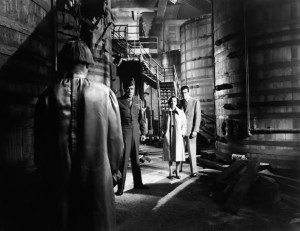
In ‘The Third Man’ Cotten can’t penetrate the webs of intrigue between the competing occupying powers and the Germanic public. Ultimately he leaves disillusioned and taught a harsh lesson. Here Ryan’s all American energy and decency do win the day and strive to bring together the various distrustful European groups, including at the end offering a glimpse of entente with the Russians. It’s a propaganda film really, a vision for a new Europe where so many people were living hand to mouth in devastated surroundings that old allegiances and politics needed to be discarded and the idealists listened to. As such it can be a little hard to take seriously at times even though Ryan is an excellent lead who embodies quiet, tough decency and the stark photography of ruined German cities make their own very powerful case.
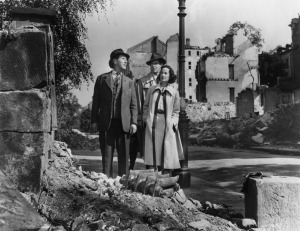
Similarly to the way ‘Night Train to Munich’ treated the Germans the movie allows its Red Army character to come out on top in a lot of the interaction with the western characters. The cold war might have been starting and the divisions in Germany are a key part of the story but memories of the war were very fresh and there is a respect here for the tough directness of the Russian army.
It’s a pacifist propaganda movie shot by a stylist whose best work came in Film Noir and Horror with a lead man who was best known for playing villains or at least tortured heroes and that makes a very interesting mix. None of it quite fits but you do still get to see a killer clown hunting someone over the shadowy real life ruins of Frankfurt and rather than seeming camp in Tourneur’s hands it is genuinely creepy.
As are the brutal Nazi loyalist villains, preying on the hopes of a broken displaced population. As with everything else the stark reality of the destroyed Germany on show elevates their hatred of the occupying forces from the cartoonish. The film shows the Germans for a once historic city following the US occupiers for cigarettes and sweets, offering sex to soldiers for essentials , crowding around boards for news of missing loved ones. The amazing documentary nature of the filming gives depth to what could have been a pretty shallow movie.
I’m a big fan of Tourneur and of Ryan and this movie is good work from both. It doesn’t get into the psychology of the occupation in the way ‘The Third Man’ does, it believes in the ability of American goodness to put everything right in the way that movie doesn’t but in some ways that works, the faith in the ability to put things into the past and rebuild from literally nothing is perhaps more prescient for the West German post-war reality than the bitterness of Reed’s masterpiece is.
I can’t imagine anyone is going to come to any of these films before ‘the Third Man’ or ‘The Lady Vanishes’ or ‘Cat People’ or ‘Out of the Past’ but for anyone who wants to see more and accepts they won’t be masterpieces they are two interesting movies.
This week’s films share a theme, a year of release and an inspiration. Tabloid journalism, 1952, and Sam Fuller.
Fuller worked as a New York copyboy from the age of 12 and a crime reporter from 17. By the nineteen thirties he was also writing screen plays and pulp novels. One of them ‘The Dark Page’ was filmed as 1952’s ‘Scandal Sheet’ by Noir specialist Phil Karlson. The same year Fuller, by now a successful low budget director of war movies sunk his own money into ‘Park Row’ a dramatisation of the birth of the New York Tabloid culture. This hands on approach was necessary after studios had looked at his script and suggested a musical version.
Given Fuller’s reputation for blunt almost luridly macho movie making this might seem incredibly incongruous but Park Row is in fact a very straight historical movie.
Fuller works in anecdotes handed down from the old timers he had worked with in the ‘20s and there is a vibrant edge to the movies setting but he is also genuinely excited about the importance of the shift to cheaper paper and populist campaigns. This is a director, and writer, who simply loved newspapers unironically and expected you to fall for Gene Evans’ straight talking newsman the way Mary Welch’s society girl competitor does.
Evans’ plays a newsman, thrown off Welch’s market leading Star for criticising its methods. He starts up a competitor, the Globe, cutting every corner he can to get an edition out every day he rides all of Welch’s underhand attacks to win the market and her love. It’s a film that paints the newspaper world and dangerous and ruthless but intoxicating and bigger even than the self mythologizing people whose legends it buys into whole heartedly. In truth there’s not much more depth to the movie than that and the actors don’t really bring all that much to the table. Welch although an effective femme fatale is also something of a cipher, if you were being unkind she is really just there to show that all the ladies loved the crusading newsmen just as much as the young Fuller clearly did. But that doesn’t really matter because by that point you are swept up in the romance of it all too and Fuller knows how to sell a story.
In the end it’s that sincere love that makes the film, it’s a personal movie, written, directed even financed by Fuller and if not drawn from his own life at least from the hand me down stories of his youth. A genuinely auteurist piece that tells a solid story and a bunch of cool anecdotes that clearly matter so much to the director. It is stylish and rattles along and does what it sets out to do, makes you nostalgic for an era you didn’t know and a newspaper you wouldn’t buy.
Karlson’s ‘Scandal Sheet’ is probably the better movie. It’s nastier, better structured and with a beadier eye on the prize. This isn’t 40 year old Fuller reminiscing from Hollywood about the good old days, this is the younger Fuller mining the world he knew for a lurid page turner to make his mark.
Broderick Crawford plays Editor Mark Chapman, making a huge splash at the New York Express as he takes it aggressively down market. John Derek’s star reporter is in awe of his methods, lying to the family of murder victims to get a quote and set for big things under his tutelage. This doesn’t do much for his standing with Donna Reed, the one genuinely wholesome thing in a fairly seedy movie.
One of the many populist ideas driving sales is a lonelyhearts ball and there Crawford comes across the wife he had deserted years earlier before changing his name and starting his rise in the news business. Going back with her to her rented room he sees the possibility of his new life and the respectable wealth a promise of shares in the paper holds shattering in front of him and murders her.
The fatalistic, greek tragedy, feel of this scene, of someone who can’t escape his past whatever lengths he goes to try is pure noir and sets the tone of the rest of the film perfectly. Crawford gets panicky and still needs more sales to get his shares. The prospect of a lonely heart being murdered after attending the paper’s ball is just too much and the paper piles on the readers selling the story. The rest of the movie is predictable in the way all the best noir’s are. Crime follows crime, lie is built upon lie, murder necessitates murder.
It’s an excellent noir and in its own way as much of a love letter to papers as ‘Park Row’. It shares Fuller’s movies’ pleasure in the company of the drunken old timers who remember when a paper was really a paper and its heroes are prepared to fight dirty to get a story. Everyone, well everyone except Donna Reed, is compromised but they all still hold journalism itself up as an ideal and in that, if nothing else, they are sincere.
Derek’s supposed lead character doesn’t give you much to grab hold of, there is nominally a romantic thread going on with Reed, but he deserts her, and more importantly, his own nose for a story at the crucial point. Reed however is shown to be just as much of a journalistic true believer and it is is actually her eye for a story that wins out and drives the story on. She’s the one who doesn’t give up, she’s the one who still sees value in the old timers, she rather than Crawford’s editor or Derek’s hotshot is the real newshound. And in that she joins the likes of Jean Arthur or Rosalind Russell as that other classic of the Hollywood imagination, the girl reporter.
Two very enjoyable, largely forgotten movies. Fuller’s own movie is probably the tamer of the two, Scandal Sheet is a really seedy noir in the style of ‘Ace in the Hole’ but they make a nice pair. Park Row has recently been released on the excellent ‘Masters of Cinema’ imprint. Scandal Sheet is available on a Sam Fuller box set or an Italian region 2 release.
A slightly different post this time out as I watched two very enjoyable movies starring Jean Arthur and thought I would write a little more generally about her as well as tackle them both. I’m not sure how well remembered she is these days. A few of her films, ‘Mr Deeds Goes to Town’ and ‘Mr Smith goes to Washington’ are quoted as greats of the 30s but wouldn’t really rank amongst my favourites of hers and I’d guess even a lot of people who consider themselves film buffs wouldn’t know her or how huge she was.
She is to me a very strange type of movie star, extremely closely identified with screwball comedy but never quite feeling like she fits in it. She doesn’t often play the kooky heiress or ever really get too animated or swept off her feet. She might sometimes venture into a screwball park avenue setting, ‘Easy Living’ comes to mind, maybe ‘You Can’t Take it With You’, but she is generally the voice of down to earth common sense showing the wayward scion of wealth real life and real love. Essentially she’s playing the role Clark Gable plays in ‘It Happened One Night’ or Cary Grant did opposite Hepburn or Dunne and William Powell kind of did for Myrna Loy, mixing in a little worldliness. Even in the Capra movies where Jimmy Stewart or Gary Cooper win her over she is a working city girl with bills to pay and he own skills. She might see something she misses in their small town sincerity but she’s no screwball heroine. At least not in the way the phrase was coined and the genre was seen at the time.
Even in an era when female leads were regularly in their mid 30s or early 40s she isn’t ‘sexy’ in a traditional way. I think this is largely down to her own discomfort, as soon as she is taken out of her element she kind of freezes and she was quite damning about her own attractiveness at times but by the late 30s the studios had found out what worked. It probably wasn’t promotional pics like this one…
She’s quick witted and pretty and she has a knowing voice but it’s always a very quiet, intellectually led attractiveness. She was apparently more of a traditional, sexy flapper lead in the twenties but she herself always put down her performances from that era and both the audiences and ultimately the studios came to agree. It was only with wordy, middle class, shop girls and journalists that she came into her own. Girls the hero would marry at the end after jousting with throughout not someone they’d fall for immediately. A female lead who needed the buttoned down world of post-Hays Code Hollywood to save her from being outshone by the exotic glamour girls. Someone who every time she spoke to the male lead gave the impression there was so much going on underneath that they, and I guess me, get all worked up wanting to catch up.
The earlier of the two movies I just watched was 1936’s ’Adventure in Manhattan’ where she co-stars with Joel McCrea.
I’d previously seen them paired together in 1943’s ‘The More The Merrier’ where Arthur, in her mid 40s but playing unmarried and chaste got a rare oscar nod. There she and McCrea share a really warm chemistry. Sexy in a slightly low key, last chance of happiness rather than young lust way. Here in her mid 30s she plays a showgirl, a star actress to his standard Hollywood newspaper hotshot. Ok she’s playing a nurse in a serious play about World War 1 rather than on the end of a chorus line but it’s a touch of Broadway glamour all the same and there isn’t any tinge of sadness or self mocking to her flirting. Here she knows what she has and it is McCrea who needs to measure up to her.
It’s billed as a comedy but I’m not sure that’s right. It’s a mystery and another of the early talkies era’s many love letters to the hard boiled New York newspaper world so many writers had left behind. Oh it’s definitely funny but only in that it has a sharp script and a nice, nasty way with a put down. Nothing happens for comic effect, it’s a straight, if also straightforward, mystery with Arthur on hand to fall far McCrea while also trying to bring down him down a peg or two. The humour almost all comes from their sparring not the situations or gags.
McCrea’s reporter stakes his reputation on solving a series of art and jewel robberies only to give away most of his methods while trying to impress Arthur and fall on his face. She plays an actress who came into his life when she was hired by McCrea’s tired colleagues to trick him and teach him a lesson about arrogance.
This recognition that McCrea’s character, while charming and talented, must also be a little insufferable and the way his workmates just want to quietly get on with their jobs was a lot of fun. It’s an antidote to the free spirited kookiness that infects so many of these movies where you do sometimes think the young lovers would get punched for acting the way they do. Yes McCrea and Arthur make a cute couple and their flirting is the highlight of the movie but this is a movie that also wants to take itself seriously as a newspaper film and it gets across that however big he is in his head the paper is bigger.
The mystery isn’t all that hard to work out, it’s there in plain sight (and spoilered on the DVD cover) with no unfair twists so you are largely left caring about Arthur and McCrea and both leads earn that emotional involvement well. For all his arrogance McCrea does have charm and a touch of vulnerability that means that when he fails it feels like what he needs to knock him into shape and earn Arthur’s love. She on the other hand is a fairly reactive presence, always ready with the short quip at the end of McCrea’s monologue that has you forgetting him and treasuring her. It’s an excellent part for her.
I also saw 1940’s ‘Too Many Husbands’, released at the same time as the Cary Grant/Irene Dunne ‘My Favourite Wife’ it has an almost identical, if gender reversed, plot. After Arthur’s adventurous first husband, Fred McMurray, is lost at sea she remarries solid lawyer Melvyn Douglas. A year later McMurray is found alive and she is in danger of being arrested for bigamy.
Having seen the Grant vehicle a bunch of times it took me a while to get over the similarities here. However they end up being very different movies. There is absolutely no reason for Grant to choose his current wife over the returning Irene Dunne but here Arthur seems genuinely confused over which way to go before taking charge of the situation and coming up with a solution of her own.
This is the closest Arthur gets to playing the Park Avenue heiress, she obviously comes from money and doesn’t need either husband to get by but she is also very much a grown up woman who it is shown wants as much male attention as she can get and is if anything dissatisfied with what is on offer from both of her husbands prior to the decision. It is nowehere near as funny as ‘My Favourite Wife’ but it is a lot more real.
McMurray is charming and attractive and his usual slightly forceful slightly macho self, you can see what she sees in him and Douglas automatically assumes that Arthur will return to him. Douglas plays the unshowy dedicated husband role well, I’ve noted in other reviews that he is very good at allowing actresses space to shine and he does that here as well. Both actors get a series of romantic scenes with Arthur and you, like her, are won around to each ones corner in turn.
I liked the fact that Arthur clearly likes and wants both husbands and is able to say that neither really gave her the attention she needed when they weren’t competing for her. While it would be interesting to see what Arthur could have done in an era where women weren’t so defined by marriage and their choice of men it is at least her saying that she wants more than either of them bring to the table. Her solution to the problem definitely leaves her options open.
I liked Arthur’s chemistry with both of the leads, an area where it definitely differs from ‘My favourite Wife’ where as the title suggests only one of the female leads has much to offer. I liked it least when the two guys gang up on Arthur and their egos are bruised, it is at that point that the sexism and the dated nature of the relationships is most evident. I also really liked an early scene where Arthur talks to her husband’s secretary and finds out that she has loved and fantasised about marrying both men. I kind of wondered whether that would be used as a solution to the problem but in fact the secretary never appears again. Both McMurray and Douglas seem to be actors who were happy with their films really being about the female lead and both built good careers as handsome, funny and desirable leads who would in the end never steal the limelight from the women.
Neither film is outstanding, IMDB has them both between 6 and 7 out of 10 and that feels about right but they are both very good vehicles for Arthur and allow her to display her wit, humour and warmth well. As always she feels like the most modern thing in each film and you are left wondering whether she was actually constrained by the gender roles of the time. On the other hand if society has definitely moved on I’m not sure Hollywood has as much, I can’t think of many 40 something comic actresses playing the intelligent romantic lead in as many films that were clearly built around them.
And she does only seem to work in movies built around her or where she brings the weight of real life to proceedings, I feel she gets lost in both ‘Only Angels have Wings’ for Howard Hawks opposite Cary grant, just out of her element in the exotic setting, less flashy than Rita Hayworth and unable to force her way into Hawks and Grant’s male bonding. Give her some a movie where she has a lot more about her than the male lead and a few knowing older foils to play off and she is an absolute delight.
‘Too Many Husbands’ is available on (Region 1) DVD in the ‘Icons of Screwball Comedy box set. Adventures in Manhattan is available in a Jean Arthur comedy box set available only from TCM.com’s website but I got it on it’s own from Lovingtheclassics.com
I don’t know a lot about loving the classic’s methods but I got a really nice transfer DVD shipped from the states both quickly and affordably and they offer a huge range of obscure 30s movies.
‘Theodora Goes Wild’ was chosen for the BFI’s current Screwball season and this made me seek it out, on a cheap Region 1 boxset, to see if it deserved to be listed alongside ‘The Awful Truth’ and ‘Easy Living’ let alone ‘Bringing Up Baby’.
It stars Irene Dunne as a respectable woman living out her days with her maiden aunts in a sleepy New England town named after her family. She sings in church, helps the locals with their problems and every few months goes to the big city to visit her reprobate Uncle and see how the family capital is doing. She’s in her late thirties, Dunne was 38 when the movie was released, and seems acutely aware of how many aspects of life have passed her by. So aware of them all in fact that she has written a racy novel ‘The Sinner’ under an assumed name which is the nations best selling book and is causing a storm by being serialised in the local paper. The local literary society are up in arms, listening with baited breath to salacious extracts while campaigning against the publication.
Dunne’s trip to New York to stop the serialisation brings her into contact with Melvin Douglas’ painter, responsible for the book’s lurid jacket and finds her out on the town for a night unwilling to be pigeonholed as the naive small town woman she really is. A drunken night brings her back to Douglas’ bachelor pad before it all gets a little too real for her and she runs back to the safety of the countryside. Douglas follows her, pretending to be a vagrant and threatening to reveal her secret unless Dunne takes him on as a gardner. Over her aunt’s objections she does so and the pair fall in love. Only for Douglas to flee back to New York when she proclaims her love. It transpires that he is the son of the Lieutenant Governor of New York, and despite his philandering is stuck in a loveless marriage he can’t leave while his father is in office. After he breaks Dunne free of her family ties and burdens of respectability it now falls on her to do the same for Douglas, tarnishing her own name further as she is named in his divorce proceedings. Eventually they find themselves back in the countryside and meet on equal terms free to be together.
I liked the film a lot and Dunne brought a lot of depth to her role. She is attractive and intelligent and witty but also quite clearly in her late thirties in an era and setting where being single at that age meant keeping the company of old women and never experiencing a whole range of enjoyable things. When Douglas offers her the chance of love, even when it is only Douglas offering her the chance of a drunken night in New York there is a real eagerness to finally experience life.
The age of romantic leads in the 30s and 40s is quite interesting to me. The vast majority of fondly remembered 1930s and 1940s romantic comedies feature lead actresses who were themselves in their 30s and 40s. This perhaps explains the prevalence of comedies of divorce and remarriage that I referred to in my last post. Here you really get an idea of just how stifling it was to be a single respectable adult woman. You also see the double standard of Douglas, as well as Dunne’s uncle, carrying on a string of quite obviously sexual relationships while single or even married but estranged. The movie doesn’t really comment on this explicitly but it is there in Dunne’s performance and also in the overall attack on respectability
The idea of someone in quiet obscurity gaining fame and fortune for writing a sexy novel is obviously just as relevant today and the film has as much fun with the idea as it could under the restrictive code. The desire of every straight laced old lady to hear the juiciest bits is obvious and I really liked the character of the local publisher who knows what it will do for his sales and is ready to call all the old dears on their salacious streaks.
However the code is in place and nobody can quite tackle openly just what the book contains or even make jokes about how the straight laced Dunne got her ideas. I guess the movie just says that those thoughts are probably there in everybody forced into that straightjacket of respectable femininity. They certainly seem to be there in everyone in her town.
The smalltown versus big city aspect of the movie is also enjoyable. It is superficially a theme of many comedies of the period, particularly Capra’s but also in ‘Nothing Sacred’ or ‘Hail the Conquering Hero’. But in a lot of those movies it seems a half hearted exercise, sophisticated city dwellers paying lip service to the myth of the heartland to satisfy audiences and in Capra’s movies at least the denizens of the small town seem scary and claustrophobic at the very moments their virtues are being sung. Here New York isn’t shown to be the answer but it is the very ‘goodness’ of the smalltown that is the problem and while Dunne herself comes across as wise and virtuous it is clearly shown to be because of who she is rather than where she lives. It quietly, largely by showing a genuinely good and smart person strangled by decency, makes a case for sexual excitement and the need to cut loose despite the constraints of the code.
Part of me really liked the fact the movie showed that Douglas, for all his playboy lifestyle and speeches about Dunne’s need for freedom, was just as trapped by his family. Just as unable to really seek happiness while keeping them onboard. The saddest character was probably not Dunne’s maiden aunts or busy body neighbours but Douglas’ wife, like him trapped in a loveless marriage she is unable to leave but lacking his ability to swan off to the countryside and romance whoever she feels like. Despite the symmetry and the genuine feeling that it was showing that things could be just as bad for guys this second half does not work quite as well as the first act. It keeps the leads apart at a time when you want them to be happy and to sizzle and it is a little too obvious in its mirroring of the themes. The very last act when Dunne returns home to a heroes welcome, gets to see her family loves her no matter what and brings a poetic end to the interfering of her neighbours (particularly the always excellent Spring Byington, usually the kindly older confidante in movies like ‘the Devil and Miss Jones’ but here an oppressive gossip) is far better than the 30 minutes that immediately preceded it.
All in all a very enjoyable movie that doesn’t even really feel like screwball, as much as i love the genre it feels warmer and deeper than that. I’ve not mentioned him much but Douglas does good work bringing out the best in a female lead and then letting her shine, just like he does with Garbo in ‘Ninotchka’ or Deitrich in ‘Angel’. He’s charming and just that little bit cocky and his romantic scenes with Dunne genuinely seem like people getting to know each other and realising they might have a chance at happiness.
I dont know a lot about director Bolesawski, he died young a year after this movie was made and his best known movie was an early, non musical, version of Les Miserables starring Fredric March and Charles Laughton. Here he handles the movies different tones very well and keeps things moving extremely quickly. He seems to bring out a lot in Dunne who sparkles throughout while still showing a lot of depth.
It’s a hard movie to find but if you like the period one well worth seeking out.
Rather a strange one to review this time, it stars two of my favourite 1930s leads and is a classic example of so many notable tropes that I could talk on it for hours but I was still left hoping for a little bit more while I watched it. It is a definite attempt to ape the success of The Thin Man, as the poster's reference to Powell's star sleuth status reveals, like the original Thin Man movie it attempts to work as a serious mystery as well as a comedy.
Powell was on loan to RKO from MGM and I guess RKO had gone after him solely to start their own franchise. They didnt manage to also get Loy so instead gave Powell his own choice of alternate lead and at his recommendation loaned Jean Arthur from Columbia. Powell had starred with her in several earlier movies dating back to the silent era and while they dont have the chemistry he did with Loy this probably is the sparkliest and sexiest I've seen her. She seems comfortable with Powell and at 36 is a few years younger than in the Capra, Hawks and George Stevens movies she is probably best remembered for. With a better script there could have been a real fizz about the movie.
They play a divorced couple, she a rich and succesfull mystery writer, he an eminent surgeon. They divorced due to Arthur constantly involving Powell in the research for her mysteries; a light enough reason for the audience to never really question whether they should be together or not. Arthur takes the pretext of unpaid alimony to arrive on Powell's doorstep and try and force a reconciliation and they are soon investigating the murder of a jockey.
Powell is in his element here, playing that bizarre mixture of high and low that he tied together with pure charm in so many of his pictures. He has a butler and chauffeur and an art deco appartment that is the real star of the movie; but he is also the cities top surgeon, on call to the police when they really need to get to the bottom of a cause of death while also being someone at home at the track and with a knowledge of the seedier side of town. It’s an impossibly fantastic combination of riches, talent and the common touch that Powell pulls off in a lot of his films, its definitely there in The Thin Man and he makes each aspect seem slightly like someone playing at it, as much as he oozed charm and sophistication you could tell he was as out of his element bossing a butler around as he was gossiping with the Runyonesque types at the track. I think it plays a large part in his appeal and is somehow allied to just how far he would go in search of a laugh. There is no pomposity there with Powell and it makes his sophistication all the more appealling. His handling of gangsters is visibly fake and it makes his fitting in with the toffs equally so, an important thing in the depression hit thirties where clearly being a haughty member of the upper classes could be box office poison.
Arthur gets a lot less screen time, she wasn’t Loy and they had Powell doing his Nick Charles thing and focused on that. She gets to work her magical voice a few times, particularly while impersonating people on the phone and she has a wonderfully ‘knowing how this will all turn out’ take on her interaction with Powell. For me she is someone who works via the script and that undefinable ‘feel’ she is not a great beauty, she’s not really willing to expose herself emotionally or really turn up the kooky. She just hints at these inner workings that make her lovable and make you fill in for yourself why Powell would have originally fallen for her and take her back. This isn’t one of her classics but she’s very likeable in it all the same. The movie as a whole is as well, there’s a reason it isn’t as findly remembered, if its remembered at all, as some of their other work but they still clearly like being on screen together and do the things that make their remaining fans like them.
The couple work their way through a cast of suspects and uncover an extravagant method of murder efficiently enough. The film only really raises itself when they are playing off each other and at the same time those are the moments that leave you crying out for a better script or direction to allow it to hit the real heights. They are perhaps let down by the supporting cast, Eric Blore as the butler is perhaps the best known but is both under used and annoying. Instead most of the time is spent on the various suspects and police officers who slot in and out without being particularly memorable. The mystery isn’t quite as good as in ‘The Mad Miss Manton’ and the one liners and sex appeal aren’t a patch on ‘The Thin Man’ but it’s still an enjoyable romantic thriller.
I had noticed that this was the 106th and final film of the directors career and wondered if its flatness had perhaps been a career ender but a quick look at his biographical info tells me that he in fact died, aged only 40, in the summer of 1936 cutting short a career dating back to the silent era. Writer James Edward Grant is most notable for a bunch of post war John Wayne movies rather than sparkling comedies. I think that whatever is missing from the movie probably should have come from one of them, there is too much exposition, perhaps a little too much plot, and just not enough zingers.
The film did leave me musing on the prevalence of divorce and reconciliation in the movies of the time.
Was it a hold over from the romantic lives of the stars and crew themselves?
William Powell was of course already divorced from Carol Lombard before romancing her in ‘My Man Godfrey’ and romanced many of his co-stars.
Was it a way in this movie to allow the female lead to move into the male star’s appartment while maintaining decorum?
Maybe just a way to suggest to show a courtship of two characters who had clearly slept together in the past, to make something more grown up and grounded in a sexual reality than it was possible to show in the movies of the time for characters who had just met.
A time saving way to jump all that expositionary stuff about finding out about their backgrounds and whether to kiss and just let them bounce of each other with the audience able to imagine them properly together?
Maybe just an acceptance that the leads weren’t that young and if the movie was going to end with them finding true love it perhaps should best be with someone they had already loved rather than leaving you wondering why it took them that long or how they compare to their previous entanglements. I’m not sure, but they certainly dont seem like any real divorces, they never seem to really change relationships or financial circumstances and they are always very easily undone with no lasting damage. There’s a thesis in there somewhere that would allow much enjoyable watching of 30s hokum.
Its a likeable enough hour and a half, worth seeing for the leads and the amazing art-deco sumerian inspired sets. Its a movie that you immediately know where you are with, that puts you straight into that bizzare movie created 30s world of do-gooding Park Avenue types who also knew who to place a bet with, divorces that are just an opportunity for a memorable reconciliation and murders that can keep a few flighty minds entertained between cocktails. I’d have liked it with a better script, but then i’ve already seen it with a better script, over at MGM and without Miss Arthur and any attempt to come close to that, even only this close, is fine by me.
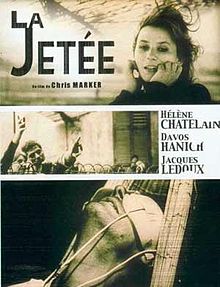
This short film that came to my attention recently following both the death of its director and its placing in the recently published Sight and Sound top 50 films of all time list.
Marker’s work tended to get categorised as ‘film essays’ and were largely factually based, this is an exception, a 29 minute film that uses a dystopian science fiction setting to comment on memory. It is almost entirely comprised of a series of filmed still photos, a narration, choral music and at times quite disturbing, muttered, indistinct and untranslated German voices.
A nuclear war has destroyed Paris and reduced its remaining inhabitants to tunnel dwelling scavengers. The few remaining scientists experiment with time travel, killing their subjects or leaving them insane as they search for someone with a particularly strong memory of the past who will be able to time travel. The human mind is cast as a museum of remembered images, the only link left to a pre-apocalyptic society.
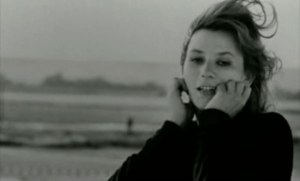
Davos Hanich, his character listed solely as ‘the man’ is haunted by the image of a womans face that he saw as a child on a traumatic day at Orly Airport. He undergoes the experiments, being sent back again and again to the pre-war past until he meets her and eventually falls in love, wandering through a museum filled with stuffed animals. This level of involvement in the past somehow detaches him from his real time and allows the scientists to send him to the future where he gains the technology needed to regenerate society.
His work done the scientists plan to execute him but he escapes once more into the past and is united with the girl at Orly aiport. As they are reunited he is shot down in front of his young self by a time travelling scientist who has followed him into the past. The image of the girls face as his older self is killed is burnt into the memory of the young boy starting the whole cycle again.
The plot, eventually to become the basis of Terry Gilliam’s ‘12 Monkeys’ is almost incidental to the experience of the film. It is in no way a science fiction adventure. The idea of our memories as snap shots of the past totally dependent on a context that we can edit or even totally lose is brought home powerfully by Marker’s use of still photographs. He moves the camera over the stills creating the illusion of movement and perpetually changing how we see the same image. He brings home how every movie is actually a succession of still images that our brain contextualises into a moving image. Here the succession is simply very slow and we have to create our own transitions between very different images.
The way we are aware of a movie camera filming an existing still photo creates layers of camera work and makes us aware of the stages between the actors and our brain. Firstly between the actor and the still camera, then between the photo and the movie camera and finally between the screen and our eyes or even our eyes and our mind. Images are constantly projected until they finally reach the place that gives them context.
I was taken with the idea of a man lying in the darkness trying to focus so hard on the frozen image he carries in his head of a beautiful woman. Feeling that if he tries hard enough he will actually travel through time to meet her evokes. It’s an excellent metaphor for the traditional escapist idea of watching a movie in a dark room and getting caught up in the action. The fact that we are concentrating really hard on the same image as the actor and using it to create a whole dystopian world where the time travel plot makes sense is very powerful. It is an incredibly knowing film about the relationship between viewer and image.
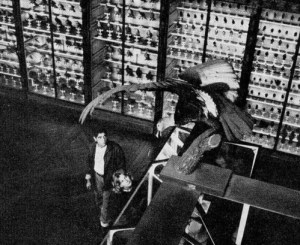
The scenes of man and woman (again these are the only names the characters are given) falling in love in the museum, a frozen image of them surrounded by stuffed, still, exotic animals. The animals are themselves permanently frozen in a faked afterlife, thousands of miles and possibly hundreds of years out of their natural context. We are made aware of the decades that have passed since the probably long dead actors were photographed in the museum as well as the in-film idea of the man out of time.
The stills do an excellent job of making the mundane seem miraculous without any dialogue about how shocking it is for Hanich to return to the pre-apocalyptic Paris.
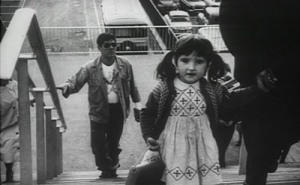
The use of music and narration casts perfectly innocent images as sinister, particularly the opening shot of Orly airport where choral music creates a heightened feeling of a disaster happening on an almost biblical scale despite the visuals simply showing a peaceful, almost touristy, view of an airport.
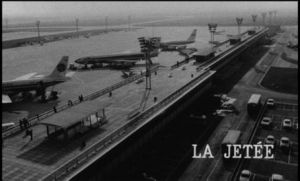
The sinister muttered German, the only dialogue from within the story that we get, works with the way the nuclear devastation is conveyed via photos of World War 2 era Paris to bring up then fairly fresh French memories of the occupation. The muttering accompanies the scientists conducting mad and fatal experiments on Parisians reduced to living in tunnels. The idea that the people living this hellish existence had to search their own memories of a more peaceful Paris to try and recreate a society obviously has resonance in the post-war French experience.
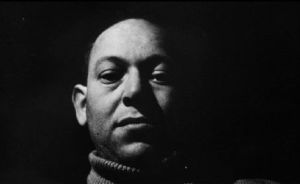
It is an incredibly impressive short film, having a lot in common with Godard’s Alphaville in the way it uses images of the everyday to create a science fiction setting through well chosen music and lighting. There are a handful of unusual and disturbing shots of the experiments but almost every other still is fairly mundane and the heightened level of menace or romantic longing comes solely from the connections and contextualisation the viewer brings to them. The same photos could have been used to tell a completely different story. We make the faces in the darkness into horrific, sadistic experimenters, just like we actually provide all the emotional context for most of the films we watch.
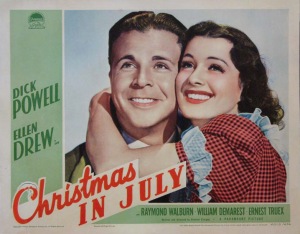
When the Coen Brothers finally got their hands on a big budget and made 1994’s ‘The Hudsucker Proxy’ I remember being introduced to the name of Preston Sturges, who the movie apparently owed a great deal to. This isn’t his most famous movie or the one with the most direct Coen’s link (I’d guess that goes to Sullivan’s Travels featuring the fictional ‘Oh Brother Where Art Thou’) but I think it is the one that Hudsucker borrows the most from. It has the same idea of someone being thrust into the spotlight on the back of an absurd idea and the same joy at satirising the silliness of corporations.
Barely over an hour long and adapted from Sturges’ own 1931 broadway play ‘A Cup of Coffee’ it tells the predictable but surprisingly sparky tale of Dick Powell’s Jimmy McDonald, an office clerk who can’t face marrying his fiancé, Ellen Drew, on his meagre salary who instead constantly dreams of the contest or slogan that will allow him to support her the way he wants to.
The movie opens with them on a rooftop, she wants to tell him about her idea for a piece of furniture that rotates and allows your one bedroom apartment a choice of functions, including a decorative non-lighting fireplace. He totally blocks her out to talk about his entry in the $25000 coffee slogan competition ‘ If You don’t sleep at night it’s not the coffee it’s the bunk’. She’s heard it, and his explanation that a Viennese scientist has proven coffee helps you sleep a thousand times and she still thinks it’s stupid.
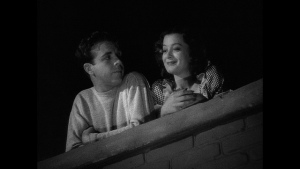
I love this first scene, Powell is just so bull-headed, meeting Drew’s every complaint with a curt Shut Up. It sets an interesting tone for the movie as Powell tries constantly to explain what is a very bad slogan based on dodgy scientific advice and Drew manages to convey love at the same time as exasperation. It includes some great physical comedy and comments from a variety of neighbours who could do without being subjected to the lovers bickering. At no point do the leads stop being likeable but it’s clear from the start that Sturges has no time for regular romance. It’s not quite as knowing as the games played by the similarly cash strapped dreamers in ‘the Palm Beach Story’ maybe Sturges just got that little bit more cynical and absurd between 1940 and 1942 but it’s an interesting take on romance.
Besides liking the way they talk at cross purposes and have clearly had this fight a hundred times I also liked the realism of Powell’s comments about not being able to support Drew on his salary, this combines with a later speech from Powell’s manager about not splitting the world into winners and losers based on income and finally one on just how many mistakes Powell’s capitalist boss makes that seemed a lot more genuine than it needed to be to give the impression that Sturges has seen the absurdity of a lot of the American social set up, perhaps because of his own storied life of adoptions and changes of circumstance and he gives both speeches more heart than you would find in more acclaimed socially aware movies of the period. I’d take Sturges over Capra on the vagaries of capitalism any day.
The lovers, along with everyone else in New York, shown in a series of hilarious fake freeze frames, tunes in to hear the winning entry in the Maxford House slogan competition only to hear the broadcast come and go in a cloud of inspired Frankin Pangorn bluster as the jury hasn’t chosen a winner. Deflated, the lovers go home to bed and a regular days work the next day.
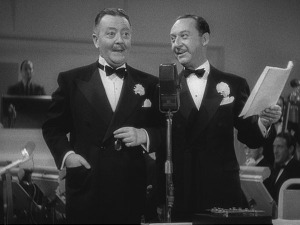
Pangborn does nothing more but read out some prizes but is completely hilarious in a tiny scene stealing part. Dr Maxford’s anger at his companies embarrassment, and the way he runs through the corridors of his building to scream at the still arguing prize jury is also hilarious, it reminded me a lot of the Coen’s constant scenes of people travelling into the heart of a stylised corporate building, especially in Huducker, ‘Intolerable Cruelty’ and in the rabbis office in ‘A Serious Man’
The Jury is locked 11-1 with the standout being Sturges regular William DeMarest, who even at this early point is clearly holding out for Powell’s slogan and ready to fight anyone who denies him his right to argue his point. As with Pangborn’s turn there is nothing in this scene that you don’t get in every single DaMarest performance but it’s still hilarious. I think to this point it is probably the out and out funniest of Sturges’ movies.
At work the next day three of Powell’s workmates fake a telegram telling him he has won the $25000 prize and he is instantly up on his desk celebrating. His boss invites him into the office to hear if he has any slogan ideas for his own firm and he soon has a raise, his own office and the afternoon off to take Drew shopping for an engagement ring.
Picking up the Maxford cheque from Dr Maxford; who hand sit over assumeing that he is just out of the loop as normal, Powell and Drew go on a massive spending spree buying up furniture for their parents and toys for the whole neighbourhood. It is only when they have returned home and started giving them all out that someone at Maxford work out the competition is still ongoing and both Dr Maxford and the department store owners turn up wanting Powell arrested and the goods returned.
An argument over just who is at fault leaves the neighbourhood with their gifts but Powell a broken man, returned to the status of failure he had been fighting against all his life. At the office it is shown that his new eminence depended on the validation given by the contest win and it is only Drew fighting for her man that keeps him his office (but loses him his raise)
As all looks lost, over at Maxford House William DeMarest has finally worn down his 11 opponents and a contest winner finally gets announced.
The sections once Powell has his hands on the cheque are nowhere near as strong as the first half. There are still some great confrontations and speeches, the dialogue and Sturges’ sense of the absurd are intact, i loved how quickly Powell’s neighbours just assumed he was drunk and delusional, but there is a lot of just watching people receive presents and a lot of build up to the inevitable eventual contest win.
In a longer film that might matter more, at 67 minutes with a first half that genuinely has me missing line after line due to laughing so much its’ less important. Powell is a likeable lead with the selflessness to happily appear dense and misguided at times. At no point does his slogan convince anyone who isn’t shown to be similarly unhinged. Drew is a little bland in the later stages but I liked her spark in the early scenes and the way she clearly has the measure of her man but loves him all the same. Sturges wouldn’t work with either lead again, I can see similarities between Powell and Joel McCrea who played similar roles in later Sturges films and Drew presumably just wasn’t as big a draw as the lead actresses Sturges soon had access to.
Sturges just seems to see the whole thing as a game, to feel that things will just fall into your lap, the more explicit message of his ‘Easy Living’ while also acknowledging that money really isn’t everything. His energy and wit and his willingness to undercut the genre have all stood up incredibly well.
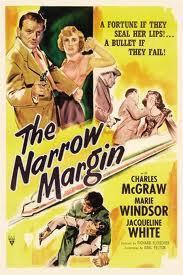
A taut RKO B-noir that initially impressed enough during production that it was left sat on the shelf for two years as Howard Hughes debated immediately remaking it as an A picture to star Robert Mitchum, who would I would imagine have been excellent in it. Fleisher was a long time director whose varied career took in Conan The Destroyer, The Jazz Singer and Soylent Green and was still working as late as 1989. Despite the long career this picture is by far his highest rated on IMDB and combines a nasty Noir feel with genuine twists and turns and a great use of a train setting.
A pair of LA cops have been sent to Chicago to pick up the widow of a gang boss so she can testify in a massive gangland/police corruption inquiry before she is murdered, their orders to get her on the LA train and keep her alive. One cop gets killed instantly and the widow, Noir Icon Marie Windsor never lets up a stream of invective that has remaining cop, Charles McGraw, constantly wondering whether she is worth sticking his neck out for. The violence is quite graphic and the movie creates the essential Noir mood that makes you feel that it doesn’t matter that the heroes are cops, they are outgunned by untouchable bad guys who simply have a better idea of how the world works. Any resistance is niave and foolish.
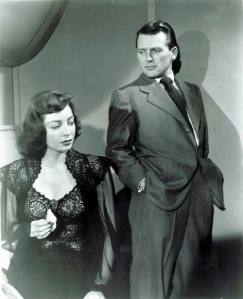
McGraw gets her on a train, already sick of the sight of her, locks her in a cabin and then sets about seeking out her possible assailants while getting to know an attractive widow and her young son. The train scenes that make up the vast majority of the movie are well shot, like classic train movies like ‘The Lady Vanishes’ you get a very paranoid atmosphere with assorted characters at very close quarters and everybody hiding something. Well everybody except the gangsters who quite brazenly proposition McGraw to give up his witness for $30000 laughing at the idea of being arrested for offering a bribe. Surely McGraw understands how the world works?
Every now and again McGraw checks in with Windsor to get another dose of scorn while trying desperately not to make Jacqueline White’s young widow seem like the girl he is guarding in the eyes of the mob.
I really liked the kinetic and quite brutal action sequences that make great use of the fact the train is constantly moving and the way that you never lose the sound of the moving train. This level of violence combines with the gangsters never quite giving up on the idea of buying off McGraw and his contempt for Windsor to make him a nicely seedy lead character. I’d never really noticed him in anything before but he comes across as a low rent Kirk Douglass or a young Richard Shaw, quite a no nonsense lead who really sells the police corruption and nastiness of the plot.
Marie Windsor is excellent throughout, I first noticed her as the poisonous, shrewish wife in Kubrick’s ‘The Killing’ and here she totally drips venom throughout, the late twists in the plot add some depth to her but don’t detract from her nasty energy in early scenes. She puts in fine performances in a number of noir films and this one is definitely not an exception. The more wholesome Jacqueline White does well too and like Windsor handles the twists of the plot while turning in a consistent performance that makes sense whatever we as the audience know.
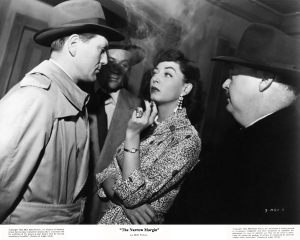
At 70 minutes with some genuine twists and turns, memorable minor characters and an effective atmosphere of menace throughout this is a really high quality minor noir and one well worth seeking out despite the lack of stars. It was remade in 1990 as a fairly average Gene Hackman vehicle
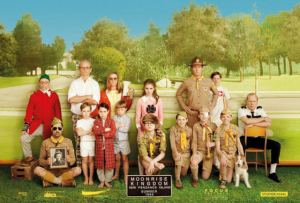
Anderson on quite familiar ground here but he generally makes things work that he hasn’t totally managed for a few movies. His movies and general style seem to have gone out of favour of late with the reaction to ‘The Fantastic Mr Fox’ and ‘Darjeeling Limited’ both quite mixed. His quirkiness seems to have become quite predictable over his short career and he doesn’t exactly move away from it here but does provide an emotional heart that the Darjeeling Limited, which I enjoyed, really didn’t have.
There is the same level of emotional detachment as in many of his films but rather than self referential irony it comes across as real sadness in almost all of the adult characters and, while the children are damaged and a bit strange, they do a least feel things. Where in the past his movies had a sheen that kept you out of the characters heads, here you can at least engage even if the emotional palate is quite limited.
It’s set in a 1960s New England that reminded me of John Cheever’s Wapshot, an outwardly comfortable, New Yorker short story world, where nobody is exactly happy but nobody really expects to be either or sees much need to change or hide it where all the damage was probably done years ago and people just got set in patterns of disappointment. Anderson uses Bill Murray at his most hangdog extremely well to show this, he knows his wife doesn’t really love him, he knows his daughter is losing it, he talks about being swept away in a storm and while he acknowledges he is feeling sorry for himself it is clear that he has thought long and hard on it and it is actually the most fitting response to his life. Bruce willis and Frances McDormand put in excellent performances of subtly different levels of sadness.
This world of Benjamin Britten performances and scout camps is disrupted when one of the scouts runs away to elope with the girl he met for a night the year before whose own life seems to be spiralling out of control. The police and the scouts are mobilised to look for the two children who in turn are set on creating their own world in the wilderness. Slowly, and unshowily, their need for something else does have an effect on the people around them, but only in tiny increments.
The cold reality for the adult characters helps you inside the absurdity of the youngsters attempts to create their own worlds really well. 12 year old, orphan, boy scout Sam knows he is unpopular both in the scouts and his foster home and would rather just live in the country with the love of his life. Susie, the occasionally violent but generally just disappointed daughter of Bill Murray and Frances McDormand’s emotionally distant lawers, who tries to block out her reality with story books and French pop but is finding it harder and harder to do. They run away so they can create their own little world in the interior of the island. The reality of most of the adults emotional lives makes the boy scouting obsessions and her storybooks seem necessary, attempts at distracting from the disappointments and constant angry violence that the two young leads seem to have found themselves in. It means we root for them without being given much to go on about what they actually see in each other or what they will do next. They both just need to get away and as bizarre as Sam’s wilderness techniques are they always seem preferable to this vision of the regular world particularly with the threat of Social Services and ECT hanging over him.
The humour as in most of Anderson’s movies is in getting inside the absurdities of the world until they seem real and then just going with it. It’s not a particularly witty or jokey script, there are some nice background sight gags but mainly you just get carried away with its own reality and it does end up seeming uplifting in a way his movies haven’t for a while. There is a lot of Rushmore about it . As in Rushmore the young performers manage a strange mix of seeming natural while playing quite odd characters. Jared Gillman reminded me a lot of Bill Milner in the thematically similar Son of Rambow.
The adult cast is also excellent, Tilda Swinton making a great pantomime villain, Bill Murray in a role that uses his world weariness perfectly and a very good Bruce Willis as a local policeman who finds that Sam actually lifts him out of his own sadness. Ed Norton is also good as the surprisingly sympathetic scout master. Bob Balaban is great as a narrator providing some of the most direct comedy of the movie.
It’s not an amazing movie but it looks great, with the usual attention of detail and meticulous colour schemes and it does manage to create it’s own fully realised world very successfully. Throw in more reason to actually care about the characters than in recent Wes Anderson movies and you have a decent surprisingly humanistic film.
